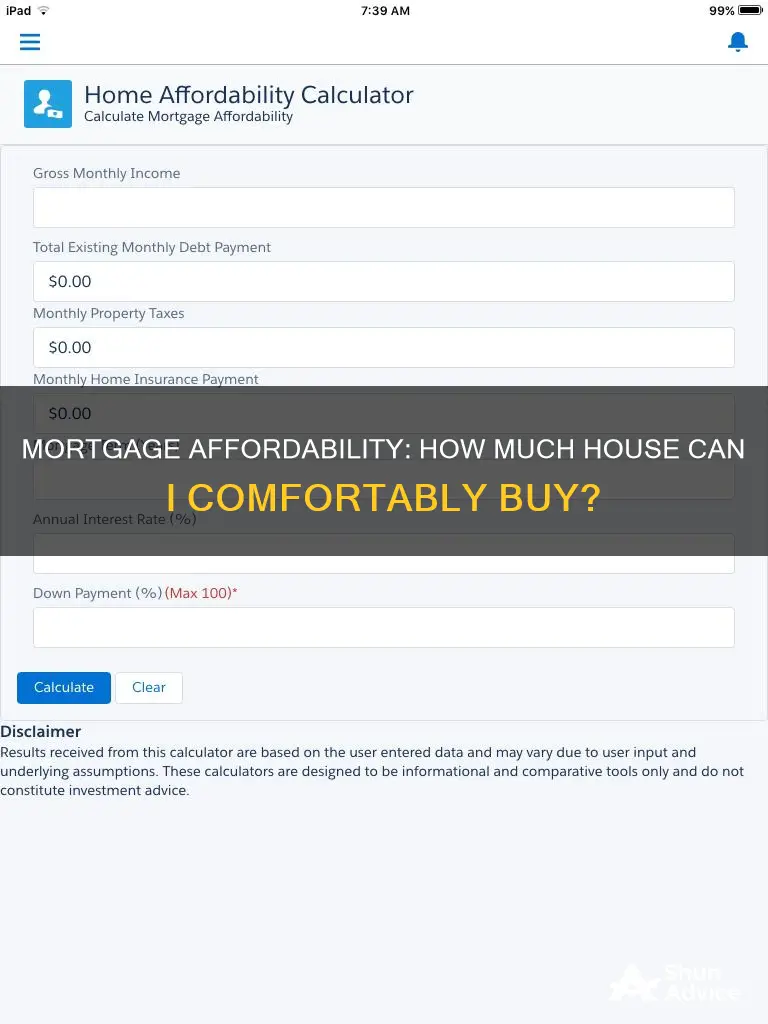
When it comes to buying a house, it's important to ask yourself, How big a mortgage can I afford? before taking the plunge. This is a complex question that depends on a variety of factors, including your income, debts, down payment, interest rate, and monthly expenses. Affordability calculators can help you estimate a comfortable mortgage amount, but it's also crucial to understand the underlying factors that determine your mortgage affordability. These factors include your debt-to-income ratio, credit score, and the potential impact of mortgage insurance premiums. By considering all these aspects, you can make a more informed decision about how much mortgage you can realistically afford and avoid becoming house poor.
| Characteristics | Values |
|---|---|
| Income | The higher the income, the bigger the mortgage you can afford. |
| Down payment | The bigger the down payment, the lower the monthly payment. A 20% down payment is ideal to lower your monthly payment, avoid private mortgage insurance and increase affordability. |
| Debt-to-income ratio | The lower the debt-to-income ratio, the bigger the mortgage you can afford. A 36% debt-to-income ratio is commonly referred to as a suggested affordability threshold. |
| Interest rate | The lower the interest rate, the bigger the mortgage you can afford. |
| Credit score | The higher the credit score, the better the mortgage rate you can get. |
| Monthly expenses | The higher the monthly expenses, the smaller the mortgage you can afford. |
| Location | The location impacts the annual property taxes, homeowners insurance, and mortgage insurance premiums. |

Down payments
A down payment is the cash you pay upfront when buying a home. It is your contribution towards the purchase and represents your initial ownership stake in the home. The mortgage lender provides the rest of the money to buy the property. The down payment is made at the closing of the sale as part of the cash-to-close payment.
A larger down payment reduces the amount borrowed with a mortgage, resulting in a lower monthly mortgage payment and less interest paid overall. It also means you will have more home equity from the outset. Lenders often view the down payment amount as the buyer's investment in the home, and a higher down payment will often result in a lower interest rate being offered. A bigger down payment also makes it easier to get approved for a mortgage.
The down payment can also influence whether the lender will require you to pay for private mortgage insurance (PMI). Typically, PMI is required if you put down less than 20% of the home's purchase price. Private mortgage insurance will increase your monthly payments, so it may be worth considering saving for a larger down payment to avoid PMI, even if that means waiting longer to buy a home.
Mortgage Surveys: Accurate or Fiction?
You may want to see also

Interest rates
Understanding Interest Rates:
Factors Affecting Interest Rates:
- Market Conditions: Interest rates are influenced by large-scale economic factors and market conditions. For example, mortgage lenders may adjust their base rates based on bond market changes or actions taken by the Federal Reserve.
- Credit Score: Your credit score plays a critical role in determining your mortgage interest rate. Lenders view a higher credit score as an indication of lower risk, which can lead to more favourable interest rates.
- Down Payment: The amount of your down payment can also impact the interest rate. A larger down payment reduces the loan-to-value ratio, making you a more attractive borrower and potentially qualifying you for lower interest rates.
- Type of Mortgage: Different types of mortgages, such as fixed-rate or adjustable-rate mortgages, may have varying interest rates. Additionally, the specific lender and their requirements can also influence the interest rate offered.
Calculating Interest Rates:
Mortgage calculators, like the ones provided by Bankrate and Wells Fargo, can be invaluable tools for estimating your monthly payments at different interest rates. These calculators allow you to input variables such as the loan term, interest rate, property taxes, and insurance to give you a comprehensive view of your potential payments.
Reducing Interest Rates:
It's worth noting that you can take steps to reduce your interest rates. Shopping around and comparing offers from multiple lenders can help you find the lowest rates available. Additionally, you may be able to pay points, which are percentages of your mortgage amount, to lower your interest rate. Each point purchased typically reduces the interest rate by less than 1%.
In summary, interest rates are a fundamental component of mortgages, and they can vary based on economic conditions and your financial profile. By understanding how interest rates work and exploring ways to optimise them, you can make more informed decisions about how big of a mortgage you can comfortably afford.
Compensation Structures for Mortgage Underwriters: What You Need Know
You may want to see also

Debt-to-income ratio
The recommended DTI threshold is 36%, according to the 28/36 rule. This means you shouldn't spend more than 28% of your gross (or pre-tax) monthly income on home-related costs and no more than 36% on total debts, including your mortgage, credit cards, and other loans. For example, if you earn $4,000 per month, your monthly mortgage payment should not exceed $1,120 (28% of $4,000), and all other debts should not exceed $1,440 (36% of $4,000).
DTI is an important metric for lenders to assess your risk as a borrower. A lower DTI indicates a healthier balance between debt and income, making it more likely that you will be able to manage your monthly payments. A higher DTI may indicate that you are overleveraged and could struggle to make payments.
You can improve your DTI by reducing your debts or increasing your income. Making a larger down payment can also help lower your monthly debt obligations, improving your DTI. It is important to keep in mind that your DTI is just one factor in a lender's decision to approve a mortgage application. Other factors include your credit score, income stability, savings, and repayment history.
Mortgages: Inflation Hedge for Long-Term Property Investors
You may want to see also

Monthly expenses
When determining how big a mortgage you can afford, it's important to consider your monthly expenses. These are recurring costs that you need to pay each month, and they can significantly impact your budget and ability to secure a loan. Here are some key aspects to consider when evaluating your monthly expenses:
Debt Payments
Debt payments are a crucial factor in determining your financial stability. Lenders will consider your debt-to-income ratio, which includes monthly debt payments such as credit card bills and student loans. It's important to ensure that you can manage your debts effectively while also covering your mortgage payments.
Utilities
As a homeowner, you will likely have utility expenses, including electricity, water, gas, and internet. These costs can vary depending on your location and usage, so it's essential to research the average utility costs in your area.
Property Taxes and Homeowners Insurance
Property taxes and homeowners insurance can add significantly to your monthly expenses. Property tax rates vary by location, so be sure to check the rates in your specific area. Homeowners insurance costs can depend on various factors, and it's recommended to get quotes from multiple providers to estimate this expense accurately.
HOA Fees
If you purchase a property that belongs to a homeowners association (HOA), you will need to pay HOA fees. These fees cover the maintenance and upkeep of common areas and amenities in your community. HOA fees can vary depending on the specific community and the services provided.
Childcare and Tuition Payments
If you have children, childcare or tuition payments can be a significant monthly expense. These costs can vary depending on the number of children and the type of care or education required. It's important to factor these expenses into your budget to ensure you can comfortably cover them along with your mortgage payments.
Transportation and Living Expenses
Transportation costs, such as fuel, public transit fares, or car maintenance, are essential to consider. Additionally, living expenses such as groceries, dining out, and entertainment should be factored into your monthly budget. These expenses can vary depending on your lifestyle and personal choices, so it's crucial to assess your spending habits in these areas.
Remember, your monthly expenses play a vital role in determining how big a mortgage you can afford. Lenders will evaluate your financial situation, including your income, savings, debt, and monthly expenses, to assess your ability to secure a loan and make timely repayments.
Paystubs: A Mortgage Application Essential
You may want to see also

Credit score
Your credit score is one of the most important factors in determining whether you'll be approved for a mortgage and what interest rate you'll be offered. Lenders view your credit score as a reflection of your financial responsibility and reliability. A higher credit score indicates that you're more likely to manage your mortgage payments responsibly, while a lower score may suggest that you're a riskier borrower.
So, what is a good credit score for buying a house? In general, a higher credit score will increase your chances of being approved for a mortgage and getting a lower interest rate. According to FICO, one of the leading credit scoring companies, a "good" credit score is typically considered to be above 670, while a score of 800 or above is considered "excellent." Most borrowers have credit scores ranging from 600 to 750, which is generally considered "fair" to "good."
However, it's important to remember that credit score requirements can vary depending on the lender and the specific mortgage product you're interested in. Some loan programs may have more stringent credit score requirements, while others are designed to help borrowers with lower credit scores. For example, FHA loans, which are insured by the Federal Housing Administration, can be obtained with credit scores as low as 580.
If your credit score is on the lower end, don't despair. There are several ways to improve your credit score over time, such as paying your bills on time, keeping your credit card balances low, and avoiding opening new credit accounts unnecessarily. It's also a good idea to review your credit report for any errors or discrepancies and dispute any inaccurate information.
Conversely, if you have a high credit score, you're in a good position to secure a favorable mortgage deal. A strong credit score demonstrates your creditworthiness and can lead to lower interest rates, saving you thousands of dollars over the life of your loan. Maintaining a good credit score involves consistent financial responsibility, including timely payments and prudent management of your credit accounts.
Late Mortgage Fees: Collection Methods and Your Options
You may want to see also
Frequently asked questions
The amount of mortgage you can afford depends on your income, debts, down payment, credit score, and interest rate. Lenders will also consider your monthly debt payments, available cash, and your debt-to-income ratio.
Your income plays a crucial role in determining the size of the mortgage you can afford. Lenders will assess your income to determine if you can comfortably make the monthly payments. A higher income generally means you can afford a larger mortgage, as long as your debt and expenses are relatively low.
A larger down payment reduces the amount you need to borrow and lowers your monthly payments. A down payment of at least 20% is ideal as it can help you avoid private mortgage insurance and increase your affordability.
Your credit score is critical in determining your mortgage rate. A higher credit score puts you in a better position to qualify for a lower interest rate, which can make a significant difference in the size of the mortgage you can afford.







